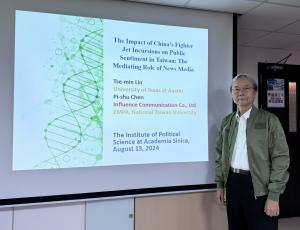
Professor Tse-min Lin : The Indirect Impact of China's Disruptive Actions on Taiwanese Society Can't Be Ignored
Professor Tse-min Lin : The Indirect Impact of China's Disruptive Actions on Taiwanese Society Can't Be Ignored
TAIPEI, TAIWAN, August 15, 2024 /EINPresswire.com/ -- On August 13, 2024, at 2:00 PM, the Institute of Political Science at Academia Sinica hosted an academic lecture titled “The Impact of China's Fighter Jet Incursions on Public Sentiment in Taiwan: The Mediating Role of News Media.” The keynote speakers are Professor Tse-min Lin from the Department of Government at the University of Texas at Austin and Ms. Pi-shu Chen, Managing Director of Influence Communication Co. Ltd. This talk will delve into the background, motives, and extensive impact of China's ongoing airspace harassment of Taiwan.Since 2016, China has been sending military aircraft into Taiwan’s Air Defense Identification Zone (ADIZ) regularly, with a notable increase in frequency after U.S. House Speaker Nancy Pelosi's visit in August 2022. In 2023, the number of incursions reached a new peak, with up to 103 aircraft involved in a single day. Professor Lin points out that these high-frequency incursions not only entail significant military expenditure but also result in substantial sunk costs and audience costs, which exert considerable pressure on the Chinese government.
Professor Lin's research deeply explores why China engages in such high-cost incursions. He suggests these actions can be viewed as a form of brinkmanship, where a show of force compels the adversary to concede, thereby gaining leverage in negotiations. According to Lin's analysis, these incursions also serve as a signaling mechanism, intended to demonstrate China’s resolve and capability to Taiwan and the international community, thereby strengthening its position in international negotiations.
Behind these strategies lies a potential risk: even if these signals fail to produce the desired effects internationally, China must still bear the enormous costs, which could impose significant internal pressure on the government.
Professor Lin's research particularly emphasizes the critical role of media in this process. His analysis shows that the way media reports on China's incursions has a significant mediating effect on Taiwanese public sentiment. Using extensive data analysis, Lin demonstrates how media outlets with different political leanings affect the hawkish and dovish sentiments among the Taiwanese public.
The study indicates that reports from green-leaning media are especially effective in inciting hawkish sentiment, while blue-leaning media tends to be more neutral. Lin's data models reveal that while the direct impact of China’s incursions on hawkish sentiment is relatively minor, the negative impact on dovish sentiment is much more pronounced, particularly under green-leaning media coverage.
Specifically, Lin used QuickseeK data, analyzing daily data from January to December 2023, through an autoregressive distributed lag (ADL) model, to assess the impact of Chinese incursions on negative sentiment in Taiwan, and explore the mediating effect of media reporting. His findings suggest that 77% of the total impact of the 2023 incursions on Taiwanese sentiment was indirect, transmitted through media reporting. Building on this, Professor Lin further explores the application of game theory to cross-strait relations. He compares the relationship between Taiwan and China to a Hawk-Dove game. In this game, if the total cost of war far exceeds the value of Taiwan’s sovereignty, the game tends to gravitate towards a “Taiwan cooperates, China asserts dominance” non-cooperative Nash equilibrium. Lin argues that China’s incursions are attempts to shift this game in its favor.
In conclusion, Professor Lin notes that while China’s aircraft incursions have not directly altered the hawkish or dovish sentiments of the Taiwanese public, they have had a profound indirect impact on social sentiment through media influence. Green-leaning media reports have intensified hawkish sentiment, whereas blue-leaning media reports have had a more subdued effect. Lin’s research not only unveils the complex motives behind China’s military actions but also underscores the crucial role of media in this process. This lecture will provide valuable data and theoretical frameworks for the study of cross-strait relations, contributing significantly to understanding future interactions across the Taiwan Strait.
Jared Liang
ChoozMo AIGV Platform
email us here
Visit us on social media:
LinkedIn
Distribution channels: Conferences & Trade Fairs, Media, Advertising & PR, Military Industry, Politics, World & Regional
Legal Disclaimer:
EIN Presswire provides this news content "as is" without warranty of any kind. We do not accept any responsibility or liability for the accuracy, content, images, videos, licenses, completeness, legality, or reliability of the information contained in this article. If you have any complaints or copyright issues related to this article, kindly contact the author above.
Submit your press release

